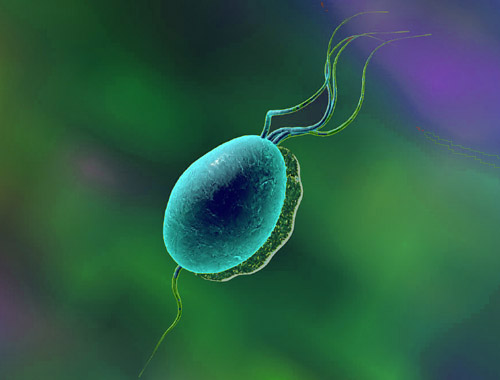Trichomoniasis

Published: 18 Jun 2025
ICD9: 131.9 ICD10: A59.9 ICD11: 1A92
Trichomoniasis (or "trich") is a very common sexually transmitted infection (STI) caused by a microscopic parasite called *Trichomonas vaginalis*.
Here's a breakdown:
![]() Cause: The parasite *Trichomonas vaginalis*.
Cause: The parasite *Trichomonas vaginalis*.
![]() Transmission: Spread through sexual contact (vaginal, anal, or oral sex) with someone who has the infection. It primarily infects the vagina, urethra, or both in women, and the urethra in men.
Transmission: Spread through sexual contact (vaginal, anal, or oral sex) with someone who has the infection. It primarily infects the vagina, urethra, or both in women, and the urethra in men.
![]() Symptoms: Many people with trichomoniasis don't have any symptoms. When symptoms do occur, they can range from mild irritation to severe inflammation.
Symptoms: Many people with trichomoniasis don't have any symptoms. When symptoms do occur, they can range from mild irritation to severe inflammation.![]()

![]() Women:
Women:![]()

![]() Frothy, yellow-green vaginal discharge with a strong odor.
Frothy, yellow-green vaginal discharge with a strong odor.![]()

![]() Painful urination.
Painful urination.![]()

![]() Vaginal itching, burning, or redness.
Vaginal itching, burning, or redness.![]()

![]() Discomfort during sexual intercourse.
Discomfort during sexual intercourse.![]()

![]() Lower abdominal pain (rare).
Lower abdominal pain (rare).![]()

![]() Men:
Men:![]()

![]() Itching or irritation inside the penis.
Itching or irritation inside the penis.![]()

![]() Painful urination.
Painful urination.![]()

![]() Discharge from the penis.
Discharge from the penis.
![]() Diagnosis: A health care provider can diagnose trichomoniasis by examining a sample of vaginal fluid (in women) or urine (in men) under a microscope or through other lab tests.
Diagnosis: A health care provider can diagnose trichomoniasis by examining a sample of vaginal fluid (in women) or urine (in men) under a microscope or through other lab tests.
![]() Treatment: Trichomoniasis is curable with antibiotics, usually metronidazole or tinidazole. It's important for both partners to be treated to prevent reinfection.
Treatment: Trichomoniasis is curable with antibiotics, usually metronidazole or tinidazole. It's important for both partners to be treated to prevent reinfection.
![]() Importance of Treatment: If left untreated, trichomoniasis can increase the risk of:
Importance of Treatment: If left untreated, trichomoniasis can increase the risk of:![]()

![]() For Women:
For Women:![]()

![]() Pelvic inflammatory disease (PID).
Pelvic inflammatory disease (PID).![]()

![]() Premature labor and low birth weight babies.
Premature labor and low birth weight babies.![]()

![]() Increased susceptibility to HIV infection if exposed.
Increased susceptibility to HIV infection if exposed.![]()

![]() Increased risk of cervical cancer.
Increased risk of cervical cancer.![]()

![]() For Men:
For Men:![]()

![]() Increased risk of prostate cancer.
Increased risk of prostate cancer.![]()

![]() Increased risk of HIV infection if exposed.
Increased risk of HIV infection if exposed.
![]() Prevention: The best ways to prevent trichomoniasis are:
Prevention: The best ways to prevent trichomoniasis are:![]()

![]() Abstaining from sexual activity.
Abstaining from sexual activity.![]()

![]() Having a long-term mutually monogamous relationship with an uninfected partner.
Having a long-term mutually monogamous relationship with an uninfected partner.![]()

![]() Using condoms correctly every time you have sex.
Using condoms correctly every time you have sex.
Key Takeaways:
![]() Trichomoniasis is a common and curable STI.
Trichomoniasis is a common and curable STI.
![]() Many people don't have symptoms, so regular STI testing is important, especially for sexually active individuals.
Many people don't have symptoms, so regular STI testing is important, especially for sexually active individuals.
![]() If you think you might have trichomoniasis or any other STI, see a doctor or other healthcare provider for testing and treatment.
If you think you might have trichomoniasis or any other STI, see a doctor or other healthcare provider for testing and treatment.